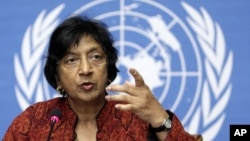GENEVA - The U.N. High Commissioner for Human Rights is condemning the recent deadly bomb attacks on churches by the radical Boko Haram group in Nigeria. High Commissioner Navi Pillay says the violent acts may amount to crimes against humanity.
Over the past week, scores of people have died in a wave of violence and killings, including suicide attacks on churches in Nigeria by the Boko Haram group. Some of the victims reportedly died in subsequent retaliatory attacks by Christian youths in the city of Kaduna and in clashes between security forces and protesting Muslims.
U.N. High Commissioner for Human Rights Navi Pillay condemns the repeated attacks by Boko Haram on places of worship and on religious freedom. Her spokesman, Rupert Colville, says she is very concerned about this extremist Muslim group's attempts to stir sectarian tension and violence between two communities that have lived together peacefully for so long.
“Members of Boko Haram and other groups and militias if judged to have committed widespread or systematic attacks against a civilian population -- including on grounds such as religion or ethnicity -- are likely to be found guilty of crimes against humanity," said Colville. "Deliberate acts leading to population “cleansing” on grounds of religion or ethnicity would also amount to a crime against humanity.”
The recent attacks by Boko Haram have resulted in some political “collateral damage.” Nigerian President Goodluck Jonathan, who has been heavily criticized for his inability to stop the violence in the north, has fired his national security advisor and defense minister.
The U.N.’s human rights chief urges Nigerian authorities to take measures to curb inflammatory words or hate-speech and to work with civil society and religious leaders to help deal with these deadly threats.
Spokesman Colville tells VOA some religious leaders have been working together to avoid flare-ups or retaliatory violence. But, he says this is an uphill battle and serious incidents continue to occur every month or two.
“It is a pretty horrific stream of attacks, nearly always triggered by Boko Haram initially and then these follow-ups," said Colville. "So, it is a very worrying situation. Obviously, the authorities are reacting, but it continues.
Acts of inter-communal and political violence are a common cause of displacement across Nigeria, but no accurate figures are available to show how many may have been triggered by Boko Haram attacks.
However, the International Organization for Migration does document one case in which a group of 1200 children from Chad, who had been studying the Koran in northern Nigeria, fled with their teachers to Chad to escape the violence.
The U.N. High Commissioner is urging Muslim and Christian leaders to redouble their efforts to contain dangerous forms of religious intolerance and inter-communal violence.
Over the past week, scores of people have died in a wave of violence and killings, including suicide attacks on churches in Nigeria by the Boko Haram group. Some of the victims reportedly died in subsequent retaliatory attacks by Christian youths in the city of Kaduna and in clashes between security forces and protesting Muslims.
U.N. High Commissioner for Human Rights Navi Pillay condemns the repeated attacks by Boko Haram on places of worship and on religious freedom. Her spokesman, Rupert Colville, says she is very concerned about this extremist Muslim group's attempts to stir sectarian tension and violence between two communities that have lived together peacefully for so long.
“Members of Boko Haram and other groups and militias if judged to have committed widespread or systematic attacks against a civilian population -- including on grounds such as religion or ethnicity -- are likely to be found guilty of crimes against humanity," said Colville. "Deliberate acts leading to population “cleansing” on grounds of religion or ethnicity would also amount to a crime against humanity.”
The recent attacks by Boko Haram have resulted in some political “collateral damage.” Nigerian President Goodluck Jonathan, who has been heavily criticized for his inability to stop the violence in the north, has fired his national security advisor and defense minister.
The U.N.’s human rights chief urges Nigerian authorities to take measures to curb inflammatory words or hate-speech and to work with civil society and religious leaders to help deal with these deadly threats.
Spokesman Colville tells VOA some religious leaders have been working together to avoid flare-ups or retaliatory violence. But, he says this is an uphill battle and serious incidents continue to occur every month or two.
“It is a pretty horrific stream of attacks, nearly always triggered by Boko Haram initially and then these follow-ups," said Colville. "So, it is a very worrying situation. Obviously, the authorities are reacting, but it continues.
Acts of inter-communal and political violence are a common cause of displacement across Nigeria, but no accurate figures are available to show how many may have been triggered by Boko Haram attacks.
However, the International Organization for Migration does document one case in which a group of 1200 children from Chad, who had been studying the Koran in northern Nigeria, fled with their teachers to Chad to escape the violence.
The U.N. High Commissioner is urging Muslim and Christian leaders to redouble their efforts to contain dangerous forms of religious intolerance and inter-communal violence.









